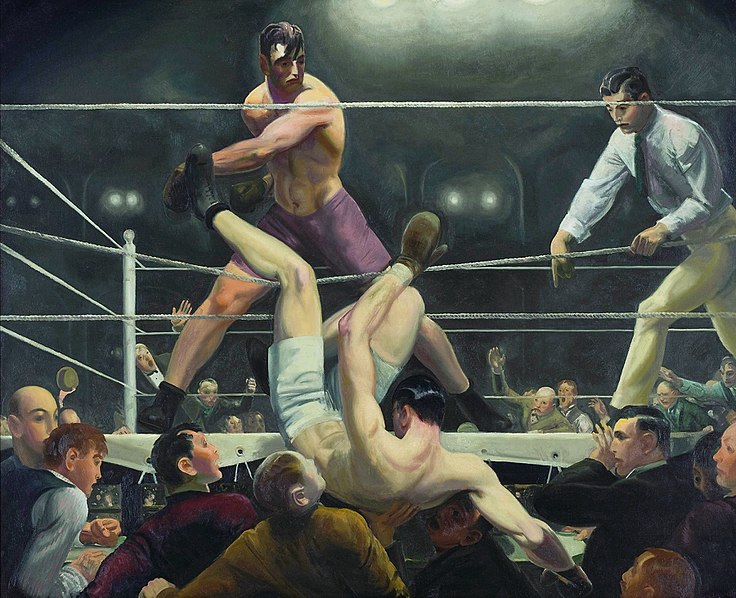
George Dempsey and Firpo 1924
by George BellowsDue today: passive to active voice exercise from anyone absent on Friday, January 31 and responses to the introductory material on realism covered in class yesterday. On Friday, you have an assessment on those 13 words. Review daily!
In class: assessment on changing sentences from passive to active voice
AND Realist poem "Richard Cory" by Edward Arlington Robinson
Richard Cory
Whenever Richard Cory went down town,
We people on the pavement looked at him:
He was a gentleman from sole to crown,
Clean favored, and imperially slim.
And he was always quietly arrayed,
And he was always human when he talked;
But still he fluttered pulses when he said,
"Good-morning," and he glittered when he walked.
And he was rich—yes, richer than a king—
And admirably schooled in every grace:
In fine, we thought that he was everything
To make us wish that we were in his place.
So on we worked, and waited for the light,
And went without the meat, and cursed the bread;
And Richard Cory, one calm summer night,
Went home and put a bullet through his head.1. How many stanzas are in the poem?
_______________
2. First
stanza: what is implied by
Richard Cory going “downtown?”
__________________________________________________________________
3.
To
whom does the “we the people on the pavement refer”?
_____________________________________________________________________
4.
Second
stanza: What words and phrases are used to describe Richard Cory’s behavior and
attire?________________________________________________________________________________________________________________________________________________________________
5.
What
does this indicate about his character?
_________________________________________________________
________________________________________________________________________________
6.
Stanza
3: How does the reader know that the speaker is referring to Cory’s money, not
personality and a successful life?
________________________________________________________________________________________________________________________________________________________________
7.
Stanza
4: How do the first two lines of the last stanza once more demonstrate the
differences between the two socio-economic classes appearing the poem: the
common working-class and the rich?
________________________________________________________________________________
________________________________________________________________________________
8.
Why
did Richard Cory, an icon of success, kill himself? Respond in a minimum of
three thoughtful, well-written sentences. This is 50% of the class
participation assessment.
________________________________________________________________________________
________________________________________________________________________________
________________________________________________________________________________________________________________________________________________________________

No comments:
Post a Comment